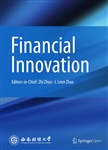Exploring the moderating role of financial development in environmental Kuznets curve for South Africa:fresh evidence from the novel dynamic ARDL simulations approach
作者机构:School of EconomicsDepartment of EconomicsUniversity of PretoriaHatfield CampusPrivate Bag X20Hatfield 0028South Africa
出 版 物:《Financial Innovation》 (金融创新(英文))
年 卷 期:2023年第9卷第1期
页 面:79-130页
核心收录:
学科分类:02[经济学] 071010[理学-生物化学与分子生物学] 081704[工学-应用化学] 07[理学] 08[工学] 070101[理学-基础数学] 0710[理学-生物学] 0202[经济学-应用经济学] 1202[管理学-工商管理] 0201[经济学-理论经济学] 020205[经济学-产业经济学] 020105[经济学-世界经济] 0817[工学-化学工程与技术] 0701[理学-数学]
主 题:Financial development Trade openness CO_(2)emissions Dynamic ARDL simulations Energy consumption EKC Cointegration Economic growth Foreign direct investment Industrial value-added South Africa
摘 要:The extant literature has produced mixed evidence on the relationship between finan-cial development and ecological *** work addresses this conundrum by investigating financial development’s direct and indirect consequences on ecologi-cal quality utilizing the environmental Kuznets curve(EKC)methodological *** empirical analysis is based on the novel dynamic autoregressive distributed lag simulations approach for South Africa between 1960 and *** results,which used five distinct financial development measures,demonstrate that financial develop-ment boosts ecological integrity and environmental sustainability over the long and short *** the instance of South Africa,we additionally confirm the validity of the EKC *** importantly,the outcomes of the indirect channels demonstrate that financial development increases energy usage’s role in causing pollution while attenuating the detrimental impacts of economic growth,trade openness,and foreign direct investment on ecological ***,the presence of an inadequate financial system is a requirement for the basis of the pollution haven hypothesis(PHH),which we examine using trade openness and foreign direct investment *** for both of these variables disappears when financial development crosses specified ***,industrial value addition destroys ecological quality while tech-nological innovation enhances *** research provides some crucial policy recom-mendations and fresh perspectives for South Africa as it develops national initiatives to support ecological sustainability and reach its net zero emissions goal.



